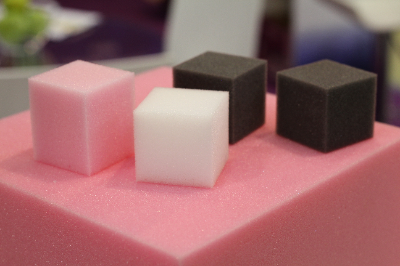All Categories
History
This section provides an overview for urethane foams as well as their applications and principles. Also, please take a look at the list of 0 urethane foam manufacturers and their company rankings.
Table of Contents
 Urethane foam is a foam of polyurethane resin formed after a chemical reaction between polyol and polyisocyanate mixed with a foaming agent and a foam conditioner.
Urethane foam is a foam of polyurethane resin formed after a chemical reaction between polyol and polyisocyanate mixed with a foaming agent and a foam conditioner.
The official name is polyurethane foam, but it is more commonly referred to as urethane foam. When the chemical reaction occurs, bubbles are formed.
Since each bubble exists individually and there is no connection between bubbles, and it is difficult for water and air to pass through, it is characterized by high heat insulation and water resistance.
Urethane foam is used as a heat insulator for building rooftops, ceilings, and walls. There are two types of urethane foam: factory-foamed products, which are made in factories according to various applications, and on-site foamed products, which are sprayed directly onto the target area on site.
Factory-foamed rigid urethane foam is used to insulate and waterproof rooftops of wooden houses and condominiums. It is manufactured in different shapes and sizes to suit different applications, and is used in the form of a standard board, laminated on both sides with a soft surface material (e.g., aluminum foil).
On the other hand, shot-fired rigid urethane foam is used for the internal insulation of concrete buildings and also for the filling method in wooden buildings.
1. High Thermal Insulation Properties
Gas is contained in the bubbles which provides high thermal insulation. If it is installed behind roofing materials or inside wall materials, it blocks heat in summer and cold in winter.
2. Moisture-Resistant
Due to its structure of independent air bubbles, it has excellent water and moisture barrier properties. The material does not wilt when wet, so a small amount of moisture can be left to dry.
1. Low Fire Resistance
Because urethane foam is combustible, its fire resistance is very low. It is necessary to use fire-retardant plasterboard or other fireproof construction materials.
2. Vulnerable to Termites
Termites have a habit of eating wood and plastic, and may cause damage. When installing termite-resistant materials, it is advisable to choose materials that termites do not like, such as glass wool and rock wool.
There are three main types of urethane foam.
The air bubbles are interconnected, making it both breathable and soft. It is widely used in applications such as the inside of car seats and kitchen sponges because of its high resilience and ease of processing.
Semi-hard urethane foam has a firmness between soft and hard. It is characterized by high resilience and high elasticity, and is used as the core material of bedding such as mattresses. It is also used as shock-absorbing and other shock-absorbing materials.
Rigid polyurethane foam contains gas in its bubbles and can maintain high heat insulation properties over a long period of time. For this reason, rigid urethane foam processed into a board shape is used as a building material.
*Including some distributors, etc.
Sort by Features
Number of Employees
Newly Established Company
Company with a History